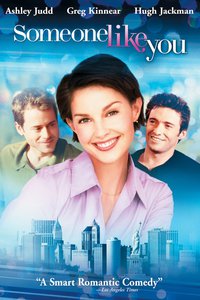Animal Attraction (2001)
US Title: Someone Like You

The premise here is that Judd and Jackman are a couple of production staffers on a TV talk show, presented by Barkin’s character. Having been jilted by her commitment-phobic boyfriend, Ray (Kinnear), Jane (Judd) writes an article for her best friend’s magazine in which she poses as an agony aunt who offers a theory of human coupling based around the breeding habits of cattle. [Insert your own mad cow joke here.]
The theory catches on and she ends up becoming a columnist for the magazine, expounding her animal husbandry theory (Animal Husbandry being the working title of the movie and Animal Attraction being its UK title). Naturally her best friend and room-mate, Eddie (Jackman) disagrees, preferring a more free-wheeling approach to the whole dating game. In fact, he’s a bit of a male slut, but he’s Hugh Jackman and he’s cute and adorable and he walks around half-dressed a lot so the target female audience are pre-programmed to overlook this.
Jackman and Judd are both likeable, attractive movie stars, but they are ill-served by a soulless and sloppy script which paints him as shallow and her as neurotic and needy—which then makes it difficult to understand what they see in each other, beyond the fact that the confines of the genre dictate their inevitable end. That, and the fact that they both end up in their underwear in each other’s presence a few times, I suppose.
But if they’re given little to work with, then your pity must be heaped upon Barkin and Kinnear, both of whom are on a hiding to nothing, having cartoonish caricatures rather than roles. Marisa Tomei seems to be carving out a nice niche for herself as a perpetually unlucky-in-love supporting player and she’s probably the only actor on show not saddled with an uphill job in terms of character. Of course, she’s on screen so little, it hardly matters.
And, yet, it’s not a horrible film by any means. Goldwyn (Ghost, TV's Scandal) is a more than competent director. It’s attractively shot with high studio production values, a big name cast and great locations. But there is barely a shred of originality in the entire enterprise, like someone sat down with five or six good films, picked the best bits from each of them and then tried to work a script around that.
And that’s the over-arching fault with the movie: it’s utterly contrived, to the point that, when a sub-plot involving Jane’s sister’s struggle to start a family is introduced, it might as well have a flashing sign above it saying “Message: love is sometimes not enough, life can be hard”.